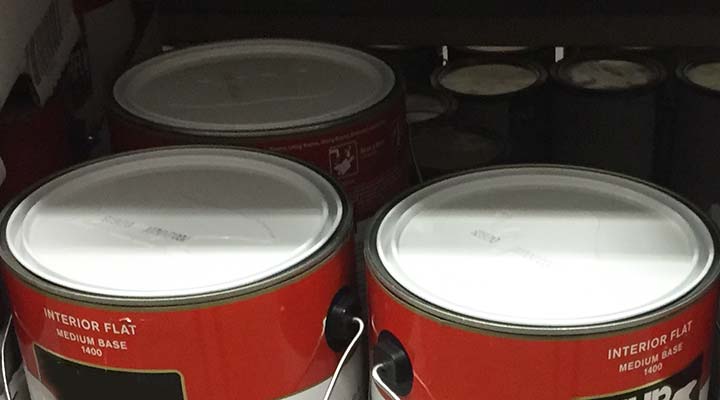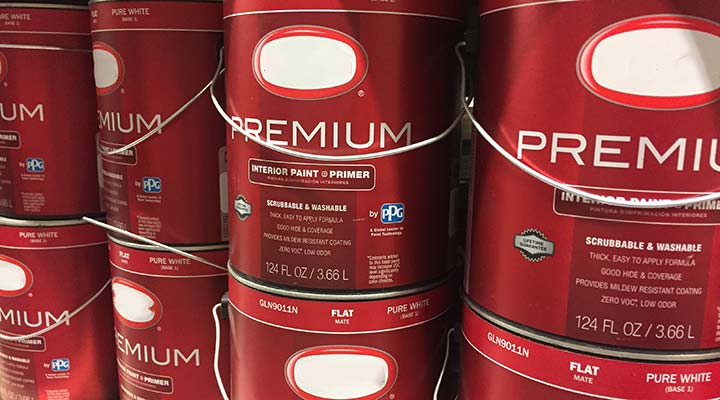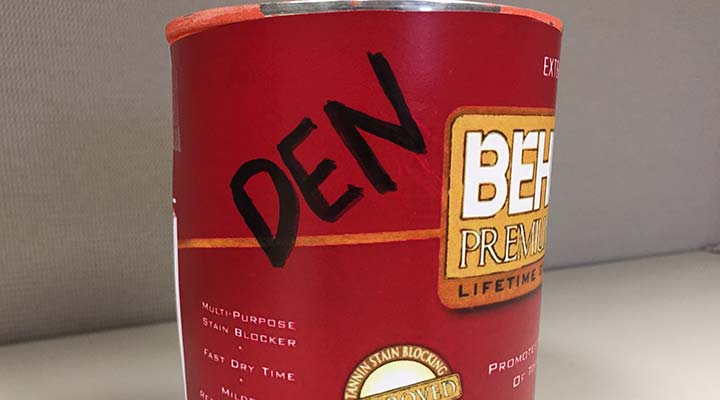
How to Store Paint and Brighten a Home for Years to Come
Mar 31, 2023 / Alyssa Duranty
When middle school teacher Alyssa Terpstra and her husband inherited their first place in Long Beach, Calif., it took a lot of elbow grease to personalize the 100-year-old house and make it feel like home. In order to save cash, the young couple did their own painting, working their way through the house on their days off over a couple of months. In the process they learned how to store paint, for the next work day and for touchups down the road.
“The bedroom walls were a horrible, yellow color,”; she said. “It’s really laborsome, but we were able to paint all the rooms in the house without help.”;
The couple only painted on the weekends and when Terpstra wasn’t in school getting her teaching credential, so there were weeks when gallons of paint went untouched. They reached out to painting pros to get the best tips to keep their paint fresh through the process.
If you’re looking to freshen up a room, or perhaps you’re moving into a place you’d love to make your own, read on for helpful tips on how to store paint to keep it fresh for the inevitable scrapes and nail holes that need touching up over time.
Secure Lids to Paint Cans Before Storing
Make sure the paint can lid is fully locked on before you store it, to help ensure the paint will last for years to come.
“Clean the outer lip that the lid snaps into and hammer around the edge,”; said pro Eric Welch, who has been painting homes for 12 years in the Madison, Wis. area. “You don’t want to bend the lid down and in, so just strike the perimeter of the lid.”;
Also consider covering the closed lid with a paper towel just before you hammer it shut. This will help protect your tool from paint and avoid splattering any of liquid that may still be on the lid.
After getting a few pointers from Terpstra’s uncle, a contractor with house-painting experience, the couple was able to keep their paint pristine through their project.
What they didn’t consider was their home’s windows. Many of them were painted shut, a lesson Terpstra only had to learn once.
“We had to shove knives in there to open them up,”; she said. “Whatever you do, remember to keep the windows open. It will also help the fumes circulate. Another thing we learned the hard way.”;
Fortunately, they had extra paint on hand, and stored well, to touch up the windows after that experience!
Store Paint Cans Away From Heat and Water
Keep paint cans away from heat and in a place with few temperature fluctuations to keep the chemicals inside from separating or expanding and prevent the can’s lid from slowly popping open.
“Heat can dry out paint, especially when the lid becomes unsecure,”; said Welch.
Frozen paint can also become unusable because the texture will change, say experts. Avoid water-prone areas to minimize rust, which can fall into the paint and ruin it, said Welch.
During the few months of their home painting project, the Terpstras kept their paint cans in a dark space inside the house to avoid exposure to the rain storms outside.
“We kept the paint in the hall closet, because it had nothing in it and it had plenty of space,”; she said.
Garages, basements and sheds are all good places for long-term storage, said Welch.
Label Cans and Drop Old Paint Off at Designated Centers
Remember which paint goes in which room by labeling the cans, so when it comes time to touch up your beautiful paint job (scratches, smudges and stuff happen), you’ll be ready and won’t have to buy a whole new can just to cover a nail hole.
“Write on a piece of tape and put it on the can, or write directly on the label to describe what room it’s for,”; said Welch. “Make it really clear, because years later you won’t remember.”;
“And repurchasing paint will be that much easier.”;
Paint will get old and separate, usually after about 5 years, and your nose will know when it’s gone bad.
“It will start to rot and will smell like rotten eggs,”; said Welch. “If it stinks, then it’s gone bad.”;
Once the Terpstras finished beautifying their old and charming home, there were some cans they knew they would no longer need. So they dropped them off at a local paint store.
Many paint stores will accept used paint. Try this paint drop-off locator to search for a place that offers this service. You can also check for a community hazardous waste drop-off location or ask about a designated hazardous waste trash day. It’s important to avoid throwing away leftover paint with the rest of your garbage because it is considered a hazardous material; tossing it with trash may be breaking some local laws.
“Storing paint is not complicated, but it should be done right so you’re not paying for it later,”; Welch said.









